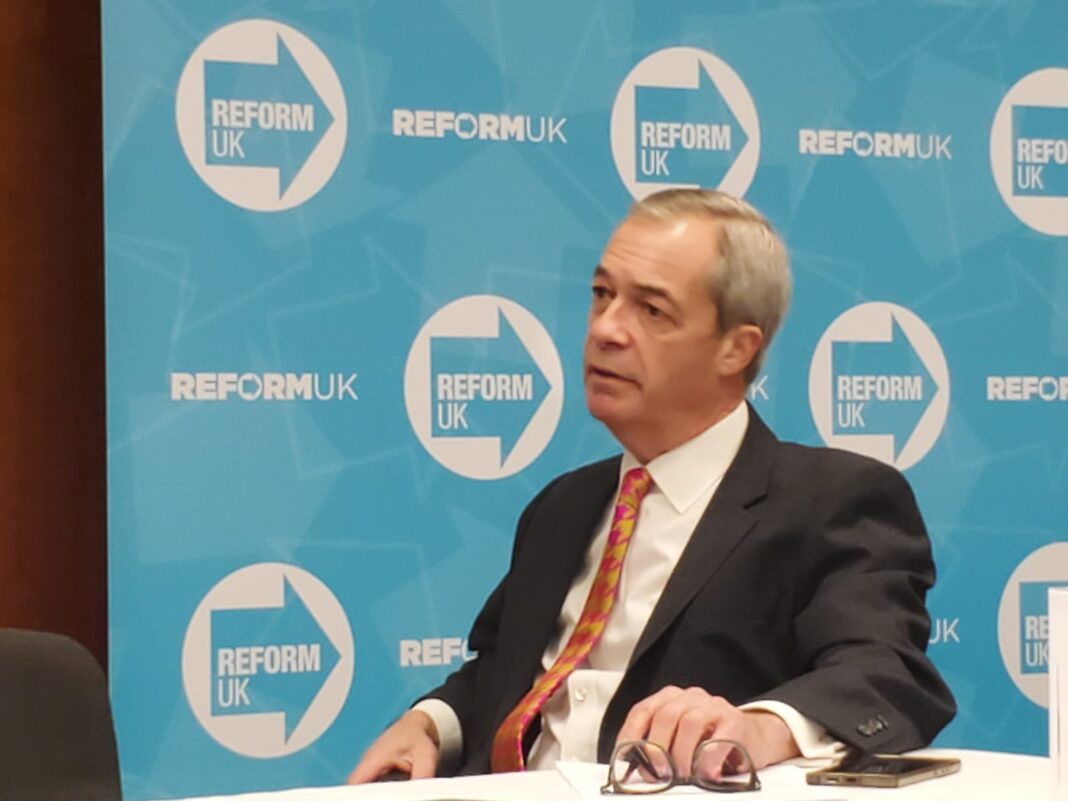14 JANUARY 2025 | NEWS
Visiting the North West regional conference for Reform UK in Chester, Wolves found a buzz of excitement from all those present, as well as considerable media attendance. The harrowing story of former rape gang victim Elizabeth Harper was also presented, by the victim herself, to a respectful silence.
We spoke to the party’s leader, Nigel Farage, about a range of issues, which we will outline here.
Wolves noted that Mr Farage had previously spoken to us about introducing legislation to repeal the Human Rights Act of 1998 on day one as Prime Minister, should he achieve this. He expanded upon this, saying that “we often talk about the Human Rights Act in terms of the boats – in terms of removing people”.
He added, however: “But when you see some of these monsters, that committed these mass gang rapes, have now served X numbers of years in prison, and are working as taxi drivers in northern towns, despite the fact that we’ve attempted to deport them again and again and again, and they’ve managed to use the ECHR as a way of staying, I think the whole thing becomes even more important.”
Acknowledging that any potential premiership is “four or five years away”, when asked about Reform UK’s China policy, Mr Farage said: “We have put ourselves into a very difficult position. We have, little bit by little bit – and probably even more after this weekend! – virtually made ourselves dependent upon them, rather than the other way around.
“I think we should be much clearer about China, in terms of critical infrastructure. I think we should be absolutely clear that we don’t want Chinese Communist money in British universities, or British schools – they’re some of the markers that we can set.
“But, I’m afraid that since the days of [former Chancellor] George Osborne, we’ve gone a long way down this road.”
Wolves noted that human rights issues were something the UK has butted heads over with China before, but on this point, Mr Farage was thoughtful, saying: “Human rights is a quite modernistic term – legalistic term – all dependent upon the State giving you those rights in the first place. Even to talk about human rights, you are talking about a State that has astonishing powers.
“Historically, we haven’t needed ‘human rights’, because we’ve had freedoms and liberties. And everything is legal when you’re born, unless there’s a law saying you can’t do things – as opposed to the European model, where every right – the right to marry, the right to live – is given to you by the State.”
On the topic of legal rights policy, Mr Farage was strident, setting out the desire for a British Bill of Rights that would form a “rectification of what the Constitution was supposed to be”. When asked whether this might involve bringing in a ‘Human Freedoms Act’, or perhaps a ‘Human Responsibilities Act’, to complement existing legislation, Mr Farage responded that “rights come with responsibilities”, adding that “a British Bill of Rights could do both of those things”.
Wolves notes separately that the notion of a British Bill of Rights – as so termed – was originally proposed by former Prime Minister Lord Cameron, who argued for it during the 2010 General Election campaign. These plans were shelved, however, when the Conservative Party took power in coalition with the Liberal Democrats following that election.
Commenting on the Constitution, Mr Farage said: “We’ve got this Constitution that’s evolved over centuries, and we all think we know what it means. But we find actually, these days, that government can ride roughshod all over it they choose to, so I do think we need something a little bit more codified.”
Wolves also asked Mr Farage about the activist Tommy Robinson, suggesting that there might be a pathway for those at risk of going in his direction to become more of the kind of person who could be acceptable to the party.
Mr Farage said: “We’re all allowed to make mistakes in life – we’re all allowed to get things wrong, especially when we’re young. I’m a great believer in Christian forgiveness, but I think the rap sheet with this particular individual is about as long as my arm.
“Frankly, I’m not going to have a fight over him, or with him … my principles have been there since the time of UKIP, and he is not suitable for a modern political party. Therefore, he will not be part of any party that I’m running, or that I’m involved with in any way. I think he’s just done too much, too often.”
However, he did also recognise that there could be a route towards rehabilitation for some other individuals, while also acknowledging that he understood why some people had sympathy with Tommy Robinson – in particular as regards the latter’s comments as to the rape gangs scandal. He further added that he disapproved of solitary confinement in prison.
Overall, while Mr Farage sought to downplay any explicit anticipations of him becoming the next Prime Minister, he remained upbeat throughout the conference as to the party’s chances of gaining significantly more seats at the next election.
Wolves will bring you the latest updates on the party’s polling fortunes as they come in. Meanwhile, YouGov’s latest polling shows Reform UK on 25% – only one percentage point behind Labour’s 26% – with the Tories averaging 22%.

























